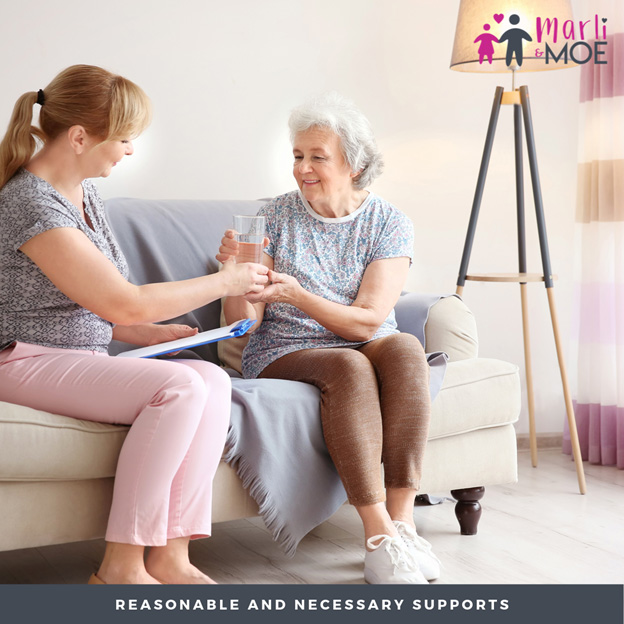NDIS Common Phrases (EP 1) - by Stephanie Gaynor
Friday, October 11, 2019
What do these phrases mean to you … and what do they mean to the NDIS?
- Reasonable and Necessary
- Choice and Control
- Ordinary Life
The above are common phrases that are NDIS staples and are often thrown around willy nilly:
Reasonable and Necessary, Choice and Control and Ordinary Life.
These can be used as a weapon for both the Participant and the NDIA
and it is important to understand these so you can have them in your
arsenal!
When supporting participants particularly if they are in a dispute with the NDIS I find pleasure in manipulating these words and supporting the participant to highlight to the NDIS why these words apply to their situation…….
The result of this = the NDIS eating their words, Participant getting outcomes, Pure Joy!!!
Over the next 3 blogs I will explain what each of these 3 phases mean to me, and more importantly to the NDIS.
Episode/Blog 1 - Reasonable and Necessary
Reasonable and Necessary supports - Known as Section 34 within the Act1
The entire NDIS is built upon the foundation of being able to objectify what are “Reasonable and Necessary”
supports, for each individual participant. This is of course the most
important question and an extremely hard one to answer let alone
quantify! This is why the NDIS so heavily relies on evidences of
Specialists, Doctors, Therapists and other Professionals.
Countless times I have had distraught and frustrated participants and/or their loved ones tell me they have told the NDIS hundreds of times exactly what is written in the OT’s or the Behavior Support Practitioners report and yet they have not listened/acted. All I can say is yes you are correct and to be brutally honest they never will
Here is why?!
(bare with me I am going to explain it in reverse cause going forward is boring)

SECTION 34 Reasonable and Necessary supports
Section 34 subsection (2) “The National Disability Insurance Scheme rules may prescribe methods or criteria to be applied, or matters to which the CEO is to have regard, in deciding whether or not he or she is satisfied as mentioned in any of paragraphs (1)(a) to (f).”
- In layman's terms REPORTS REPORTS REPORTS to prove to the NDIS how ‘said’ support meets points (a) to (f) in Section 34 subsection 1 of the Act.
Section 34 subsection (1) “For the purposes of specifying, in a statement of participant supports, the general supports that will be provided, and the reasonable and necessary supports that will be funded, the CEO must be satisfied of all of the following in relation to the funding or provision of each such support:”
- In layman's terms details must be given about what supports are provided which are not funded as well as what is being requested to be funded and how the request address’ each of the below points which are the six point of R&N
So what are these mysterious paragraphs (1) (a) to (f)
- the support will assist the participant to pursue the goals, objectives and aspirations included in the participant’s statement of goals and aspirations;
- the support will assist the participant to undertake activities, so as to facilitate the participant’s social and economic participation:
- the support represents value for money in that the costs of the support are reasonable, relative to both the benefits achieved and the cost of alternative support;
- the support will be, or is likely to be, effective and beneficial for the participant, having regard to current good practice;
- the funding or provision of the support takes account of what it is reasonable to expect families, carers, informal networks and the community to provide;
- the support is most appropriately funded or provided through
the National Disability Insurance Scheme, and is not more appropriately
funded or provided through other general systems of service delivery
or support services offered by a person, agency or body, or systems of
service delivery or support services offered:
- as part of a universal service obligation; or
- in accordance with reasonable adjustments required under a law dealing with discrimination on the basis of disability.
Lets give these some context.. Richard is 16 and lives at
home with his parents, both parents work. Richard has 2 younger
siblings 7 and 3. Richard parents have always done their best and
supported Richard with all his personal care needs this task is quite
difficult, especially since Richard has gone through puberty
(Richards disability is irrelevant but for this purpose we can
interchange his disability as either severe intellectual disability or a
physical disability such as cerebral palsy )
Richard now requires support with his personal care 3 hours per day. His parents are trying to get this funded in his NDIS plan.
- Relate to a goal in your NDIS plan.
One of Richards goals is: To build his independence with self-care activities in an age appropriate manner
Having a paid support to assist with personal care would directly relate to this goal as Richard will be building these skills but also in an age appropriate manner, as typically a teenager is not supported by their parent to shower or bath (this is unreasonable).
- Requested Support will allow Richard to participate in activities, particularly social and/or economic participation
This could be justified as working towards activities of daily living as well as ensuring Richards hygiene so he can partake in the community safely and without judgment. Hygiene is also a basic human need. Most not applicable though
- Value for money, cost vs benefit and what is the cost of the alternative and/or not getting support
There is no alternative other than parents providing personal care to a 16 young man which is undignified and unreasonable as it is not age appropriate. Benefit is that Richard can receive personal care and ensure hygiene. Cost of not receiving support, Richards parents are also struggling to uphold their other responsibilities of maintain the household and their jobs. Richards parents are at risk of carer burnout.
- Will the support be beneficial and in compliance with good practice/ current research?
Yes. the support will be very beneficial to Richard. Both by ensuring he receives adequate personal care, in line with good practice and will ensure Richards informal supports (parents) are maintained. Richards parents are able to keep their full-time employment, Care for Richard in an age appropriate manner as if they would were he not to have a disability and care Richards younger siblings/entire family unit and home without burning out.
- Can others provide the support to Richard so the NDIS do not have to pay?
No, it is unreasonable to have others such as friends or relatives wash and provide personal care to Richards as a 16yo. This is not age appropriate
- Does this specifically relate to Richard’s Disability? Is there any other Agency or governing body such as Health or Education who can pay instead of NDIS? (all governing bodies like to shriek the bill)
Support is specific to Richards disability, Richard is unable to carry out his own personal care due to his disability. Richards peers (who do not have a disability and are 16) would be expected to be able to complete their own personal care with full autonomy and independently, it is due to Richards Severe Intellectual Disability or Cerebral Palsy that he cannot. There is no other Appropriate funding body to provide or fund requested service.
As you can see the support of having 3 hours a day personal care for Richard is easily justified using the six criteria of Reasonable and Necessary. It is not always this straight forward but more often than not it is.
This is a very basic justification but shows you what to look out for in reports. Please make sure all of your reports with the intention of requesting support of backing up the need for support reference Section 34.
To have Richards support proved as a reasonable and necessary it would be absolutely necessary to have an OT functional report which should break down and address each point of Section 34 Reasonable and Necessary!
It's also great to know your Section 34 for review time as a Planner (NDIA Delegate) will be trying to figure out whether all the supports within your plan and which they are putting into your new plan are reasonable and necessary and whilst you should always have reports with you to back it up. Sometimes when common sense applies it can be enough for you to discuss and justify these points within the review meeting and it also lets the planner know you know what you are talking about and understand your rights and the support you are entitled to under the ACT.
BUT never rely on a Planner or the NDIS taking YOUR word alone.
That’s a wrap on Section 34, Reasonable and Necessary or as it’s commonly referred to R&N.
Don’t hate it, learn to apply it and then love it!!
References and further information
(including NDIS Easy to Understand video with closed captions available)
- Section 34 Reasonable and Necessary supports, National Disability Insurance Scheme Act 2013 that shows the text of the law as amended and in force on 1 July 2018 (the compilation date).https://www.legislation.gov.au/Details/C2018C00276
- Supports funded by the NDIS, NDIS website https://www.ndis.gov.au/understanding/supports-funded-ndis
- NDIS youtube Channel, Easy to Understand video (closed captions available) https://www.youtube.com/watch?v=QXQ8O3VEoYA&feature=youtu.be
This blog post was the first of a series of 3
- NDIS Common Phrase Ep1, “Reasonable and Necessary”
- NDIS Common Phrase Ep2, “Choice and Control”
- NDIS Common Phrase Ep3, “Ordinary Life”
This Series will then be closely followed by a 2 part Series, Informal vs Formal Support:
- Informal vs Formal Support - What are they?
- As a family member can I be a paid support?
These topics are all linked and understanding the NDIS Common Phrase are essential to understanding all things NDIS including Informal vs Formal Support, so be sure to follow along.
Recent Posts
- My First Iftar Dinner 🌙🍽️
- Harmony Day at School – Laming-Town Stall
- Hearing Aids
- 🌟 Mini Holiday – Disney Cruise & New Zealand 🛳️✨
- Choice and Control: Having a say in your services 🌈
- 🎉 Fashion-Able Fashion Show: Elemental | A Day to Celebrate Inclusivity & Creativity 🌟✨
- Why Pronouns Matter 💬✨
- Marli's Blog: My Dream to Work in the Allied Health & Disability Space 🏥💙
- Marli's Blog: Self-Care 💖✨
- Stimming: My Way to Keep Calm and Focused ✨💫

